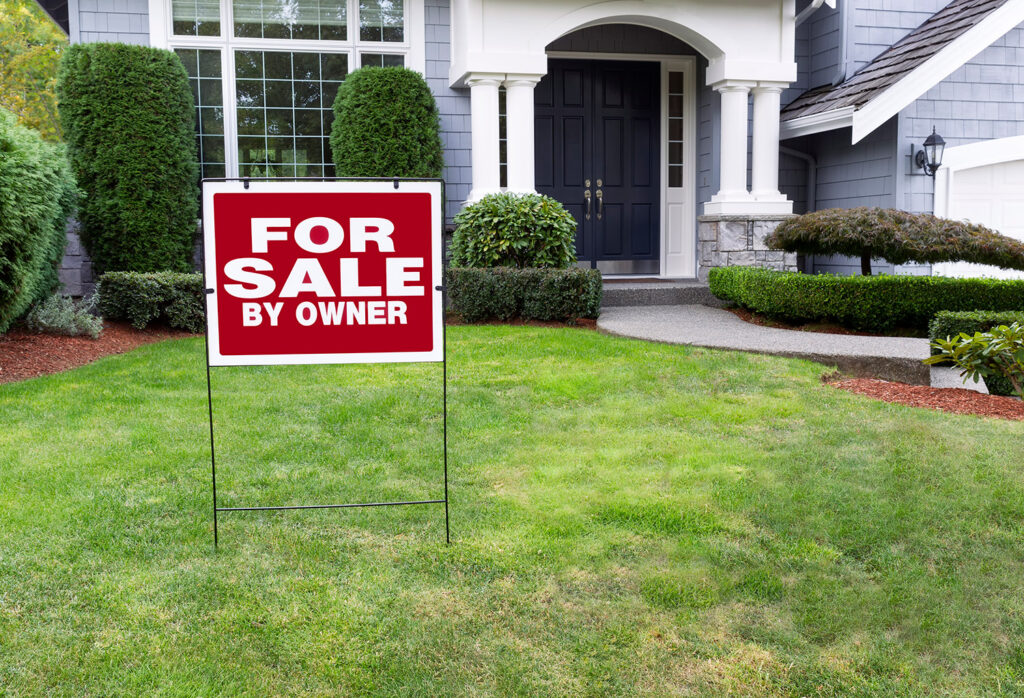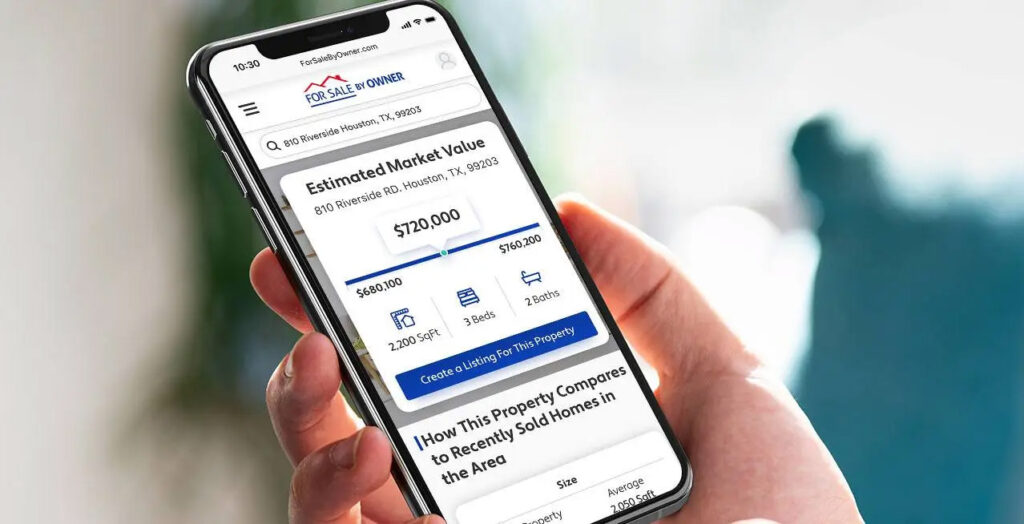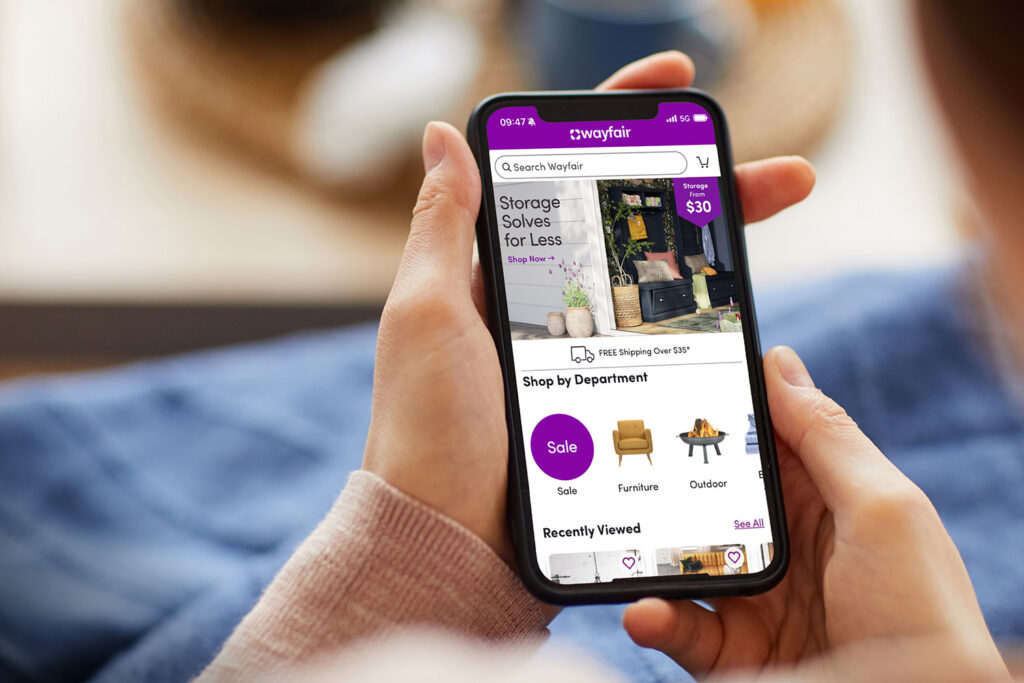If you look at homes currently on the market, you’ll probably notice something that most of them have in common: They likely have real estate agents helping to sell their homes.
While a Realtor or real estate agent can certainly help you find the right buyers for your home and get it off the market, they also require a chunk of your profits – often up to 5% of the total sale of your home. If you sell your home for $300,000, that’s $15,000 straight to your agent.
If maximizing your profit is your top priority, you might want to learn how to sell your house without a Realtor or real estate agent. This guide details how to do that while also breaking down important pros and cons to consider.
What Is a Realtor?

A Realtor (specifically, REALTOR®) is a licensed agent who’s an official member of the National Association of REALTORS® (NAR). Although many people refer to real estate agents as realtors, the term Realtor technically only applies to this subset of exclusive agents. NAR requires each Realtor to complete specific coursework to become a licensed Realtor and adhere to its standards to maintain licensure and membership.
The term real estate agent is less official, although real estate agents perform many of the same duties as a Realtor. Both a Realtor and real estate agent oversee and manage real estate buying and selling for their clients. Real estate agents who aren’t members of NAR must still meet specific requirements, like training or education and passing an exam, to become practicing real estate agents in their state.
Pros of Selling Without a Realtor
Not sure why you’d want to sell your home without a Realtor or real estate agent? Here are a few advantages to doing so:
- You can save on real estate agent commission fees
- You’ll have direct communication with potential buyers
- You get full control over the sale process
- You can provide the best, most accurate details about your home to potential buyers
- You might have a faster sale without a middle person involved
Cons of Selling Without a Realtor
Selling your home without a real estate agent can also be relatively challenging, especially if you haven’t had any experience selling a home in the past. Here are a few downsides to not using an agent:
- The process can be time-consuming if you’re not sure where to start
- There’s a potential for legal mistakes in the selling process or paperwork
- You’re responsible for handling all negotiations
- Agents often know what to say to make a sale; you may not
- You don’t have access to real estate marketing channels like agents do
Options for Selling Without a Realtor

It might be helpful to know that you have options if you decide to sell your home without a Realtor or real estate agent.
For Sale By Owner (FSBO)
The most common way is using a For Sale By Owner (FSBO) method. FSBO mimics the typical selling process, except you’ll handle all the backend work yourself, like marketing your home, conducting open houses or private showings, and comparing your homes to similar houses on the market to price it accordingly. You’ll be the sole person communicating with buyers as an FSBO seller, so it’s important to have an easy way for buyers to contact you quickly throughout the process.
Cash Sale
Another option is a cash sale, which can be a quick way to get your house off your hands. You might use this method if you don’t mind a potential buyer negotiating the price down in exchange for an all-cash sale. Cash sales still come with all the legal paperwork of FSBO sales, but they’re usually more straightforward, as you usually don’t need to spend as much time fielding offers and completing showings if you already have an interested cash buyer. Plus, a buyer paying in cash doesn’t need to secure financing, which can help speed up the selling process.
Use a Real Estate Attorney
Finally, if you’ve found a potential buyer for your home but want help with all the finalizing paperwork, you could enlist a real estate attorney. They deal with the legalities of a home sale and can take over the closing paperwork, which can be the most confusing part for sellers not using a real estate agent. You’ll still need to pay an attorney for their help, but it’s typically considerably less than the commission you’d pay an agent.
How To Sell Your House Without a Realtor
If you decide to go the route of selling on your own without a Realtor or real estate agent, make sure you have a grasp on how the process works and what your responsibilities are as the seller. Here’s how it typically works:
Prepare Your House for Sale

Although you can sell your home as-is without fixing anything or cleaning it up, you might have a harder time getting the price you want from it or finding the best buyer for the job. Buyers usually want to imagine themselves in the home before they buy it, which is why it’s important to make your home feel inviting and like somewhat of a blank slate. A real estate agent would probably give you some specific pointers on what you could do to spruce up your home and maximize your sale, including the following.
Making repairs: If your home has any priority repairs that need to be made, like a plumbing leak or a leak in the roof, consider taking care of them before selling. A large repair will take money out of your pocket now, but you may also be able to recoup those costs and more when you sell your home. Also, consider making upgrades to anything that might help your home become more appealing to buyers, like installing new kitchen cabinets or replacing an old floor in the main bathroom.
Decluttering and cleaning: Walking into a dirty or cluttered home could turn many buyers away quickly. It can be challenging for buyers to imagine themselves in your home when they’re distracted by grime or piles of clothes in the bedroom. If you don’t have time to do a deep clean yourself, think about hiring a cleaning company to tackle the job.
Staging the home: Staging your home is the process of preparing it for your prospective buyers, usually by adding new furniture and decor. It’s the most important part of the process for allowing buyers to see what the home could look like and how it can function for them. Working with an interior designer to make a few changes, even if just to key areas of the home like the master suite and kitchen, could boost your selling success.
Set the Price

Your next step is valuing your home. It’s important to strike a balance between being competitive in the market and getting the price you want. Good real estate agents can do both, as they have access to valuation tools and market research to set a fair price for your home based on other homes like yours that have recently sold in your area. Since you’re selling your home yourself, you’ll need to do some digging to price it competitively.
First, look at homes in your area that are as similar to yours as possible. Use real estate sites like Zillow or Trulia to find nearby homes, filtering them by features like size, the number of bedrooms, and the year built. Jot down the prices for each similar home, remembering to consider factors like upgrades, school districts, and yard size, which can influence value.
Then, use online tools that value your home, like ForSaleByOwner.com and Eappraisal. Plug in your address and let the tools value your home based on similar nearby homes. If you did your research properly, these tools should show your value as being within the range of prices you initially wrote down.
You can always set your price slightly higher than what competitive homes are selling for to give your buyers a bit of negotiating room. Or, try setting a lower price to see if you can draw more interest into your home.
Market Your Property

Your home needs to reach buyers – again, this is a real estate agent’s specialty. They have connections to people looking for homes and websites to list your home on, and they know where to go to find the right buyer for your house. Still, you can take on marketing tasks on your own but know that it could take more time to sell your home, as you probably can’t reach as many people as quickly as a real estate agent could.
Here’s what to do:
Take lots of high-quality photos: Good listings usually have dozens of photos taken on a sunny day to bring the best lighting into the home. Leave curtains and blinds open to increase the amount of natural lighting for your photos. Take pictures at multiple angles in each room to add to your listings. No need to purchase a professional camera; if you have an up-to-date phone, its camera should do the trick.
Write a compelling description: Look at descriptions of other homes written by real estate agents to get inspiration for yours. The best descriptions tell buyers just about everything they need to know about a home before deciding whether it could be the place for them, like how many bedrooms and bathrooms it has, its overall square footage, its yard size, whether it has any garages or additional structures, and its amenities. Use the description to sell someone on your home before they step inside its door.
Use social media to sell your home: You can use social media as an addition to online listings for your home, like sharing your home’s listing in a local Facebook Group or adding photos of it on Instagram if you have a solid local following.
Place a sign in front of your home: A “For Sale” sign in front of your home can be more powerful than you might think, especially if you live in an area that gets a lot of vehicle or foot traffic. Make sure your phone number is easy to spot on the sign from the road.
List your home online: Use selling websites to list your home online – we list some in the section below. Some are free to list and others require a payment to list. Paid sites typically come with perks to help you market your home, like listing on multiple sites at once, to increase visibility.
Listing Your Home Online

Several websites allow you to list and market your home online, reaching a range of buyers you wouldn’t otherwise reach just by promoting your home locally or in person. Here are a few free sites that you can list your home on, but be aware that they won’t offer as many features as paid sites, like listing on the Multiple Listing Service (MLS):
- Facebook Marketplace: Facebook Marketplace is your easiest option. Log into your Facebook account and find the Marketplace feature to list your home for others in the Marketplace to view. You can also share Marketplace posts to local Facebook Groups if your local Groups allow it.
- For Sale By Owner: For Sale By Owner offers a free plan to create a digital listing. It also gives you access to free pricing tools.
- Zillow: Zillow’s free listing tool lets you post unlimited photos and automatically syndicates your listing on Trulia.
Paid options cost some money upfront, but they also give you more perks when listing your home. Here are a few:
- Fizber: Fizber has plans ranging up to $395 for you to list your home with the MLS. Select plans also help you advertise your open houses and schedule showings.
- Houzeo: Houzeo offers listing plans from $399-$499+, with the higher tiers designed for first-time sellers. These plans come with a 12-month MLS listing and a licensed broker who can work with you virtually to review your documents, appraisals, and negotiations.
- List With Freedom: List With Freedom charges $89 for a six-month listing on the MLS with up to 25 photos. Upgrade to the $195 plan for unlimited photos.
Schedule Showings

Showings are an important part of the selling process, as they allow prospective buyers to actually enter your home, walk through it, and ask you questions about your home. It’s important to carefully schedule your showings so that each private group gets your full attention and ample time to explore your home.
If you use a paid service to list your home, you might already have access to a scheduling tool to schedule showings. Select Fizber plans have a built-in scheduler, for example. If not, there are some inexpensive options available to organize your showing scheduling instead of relying on the outdated pen-and-paper method.
Google offers a free booking page for Gmail users that you can use to schedule your showings. After creating your page, send buyers the link to it so they can view your open showing times and schedule one with you. You’ll see all scheduled showings on your end from your Google Calendar.
Here are a few additional scheduling apps to consider:
- Book Like a Boss: $10-$12/month for basic features
- Calendly: Free-$10/month for basic features
- Setmore: Free for up to 200 appointments or $12/month for unlimited
- SimplyBook.me: Free-$9.90/month for basic features
Negotiate Offers

If all goes well with your showings, you should start to see offers roll in. You have a few options when it comes to offers sent in by buyers:
Reject the offer: If an offer is much lower than your asking price or has too many demands for major repairs, you could simply reject the offer. The buyer can choose to walk away or make another offer.
Counter the offer: Some offers might be decent, but not quite where you’d like them to be. In that case, consider countering the offer, perhaps bumping up the sale price or negotiating a request from the buyer. For example, if a buyer wants you to pay all closing costs, you might counter with an offer to pay 75% of closing costs.
Ask for buyers’ highest and best offers: When you get multiple offers on your home, you’ll have to decide which one is best for you. One way to do that is to request that all buyers who have made acceptable offers reach back out with their highest and best offer – the absolute top offer they’re comfortable sending. This way, you have a clear picture of the best offers you’ll get to help you decide on a buyer.
Accepting the Offer
Once you find an offer you approve of, accept it. But first, consider speaking with a real estate attorney who can explain all legal terms and conditions to you so you know exactly what you agree to when you accept an offer. This also helps you negotiate any terms with the buyer, and your lawyer can draw up a proper legal response to send back to the buyer.
Legal and Paperwork Requirements

Remember how many documents you had to review and sign when you bought your home? Those documents also need to be provided to the buyer when you sell your home, including:
- The sale contract
- Any appraisal and inspection reports you’ve had for your home
- Mortgage and home insurance records
- Recent property tax statements
- The deed
- Repair and maintenance reports
- Warranties for the home and its appliances
- HOA documents, if applicable
You can create a sale contract, which lays out all the details of the purchase between you and the buyer, on your own. However, a real estate attorney should review it to ensure that it includes all necessary details.
You’ll need to hire a closing company, also known as a title company, to handle the actual buying process. They’ll oversee all the signatures and make sure each necessary document is included.
Paperwork Requirements By State
Note that many, but not all, states require a real estate attorney to finalize the sale, including Kansas, New Jersey, and Virginia. Check whether your state requires one before creating any documents and having your buyer sign them. Your buyer might have a real estate attorney of their own who can collaborate with yours, or you can find one together to handle the process.
The Closing
Congratulations – you’ve made it to the closing! This part of the process can take several weeks because it requires a lot of coordination and moving parts. The good news is that most of the hard work here lands on the buyer, but any delays on their end could affect how quickly you get paid for the sale of your home.
During the closing process, your buyer works to get an appraisal and secure their mortgage. Your closing company coordinates with the buyer’s lender to ensure that everything regarding the mortgage loan is settled before setting up the actual closing appointment. Your buyer might also request a final walkthrough of your home before closing, just to make sure everything is good to go before it’s officially in their hands.
At closing, you and your buyer will sign documents that officially transfer the home’s ownership to your buyer, including the Bill of Sale, your mortgage payoff statement, and a statement of closing costs. After the closing appointment is complete, you should expect to receive your funds from the sale of your home within a few business days.
Do any states require you to use a Realtor to sell a home?
No, you are not required to use a Realtor or real estate agent in any state when you sell your home. However, some states do require you to use a real estate attorney and closing company to close on the sale of your home.
How much do real estate agents cost?
Real estate agent commissions vary but generally can reach up to 5-6% of a home’s selling price. If you sell your home for $500,000, your real estate agent’s commission could be as much as $30,000. This amount comes out of the sale of your home rather than an upfront fee.
Is it risky for buyers to buy a home without a real estate agent?
It can be, whether they decide not to use one or their seller is selling without an agent. Real estate agents have experience with the buying and selling process, including all legal documents necessary for a successful home sale. Buyers who purchase a ‘For Sale By Owner’ home should still consider using their own agent or real estate attorney to help them through the process.
How difficult is it to sell a home without a Realtor?
It can certainly be more challenging to sell a home without a Realtor or real estate agent, as you won’t have as easy access to real estate marketing tools or have help with managing showings and negotiations. If you don’t want to pay an agent, consider using a real estate attorney, at least throughout the negotiating and closing processes.






